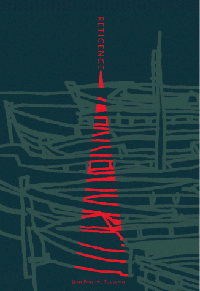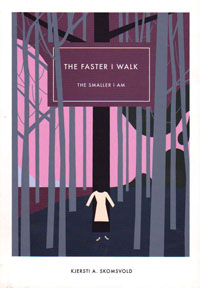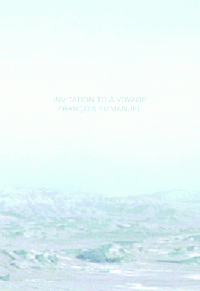RETICENCE
 RETICENCE
RETICENCE
by Jean-Philippe Toussaint
Dalkey Archive, Reprint 2012
104 pages / $12.95 Buy from Dalkey Archive or Amazon
Jean-Philippe Toussaint is a novelist who, in his initial success with publication, was often grouped alongside other novelists which many critics were considering the “post-nouveau roman writers,” writers who had, persumably, grown up reading the New Novel authors during their formative years while the New Novels were the pinnacle of literature in France. They were often marked by a return to a more, shall we say, straight-forward narrative, a return to character, but still displayed a marked attention to everything that the New Novel broke down.
It is, perhaps, not surprising then, that upon reading Toussaint’s short novel Reticence, I couldn’t help but think of Alain Robbe-Grillet’s seminal The Voyeur, published over 40 years before Toussaint’s novel (released in France in 1991, though just seeing English translation in 2012). While Toussaint’s novel avoids the fetishization & perversion that’s present “between the lines” of Robbe-Grillet’s novel (something that was seemingly never remarked upon by the author whom Barthes’ claimed wrote purely objectively), Toussaint’s novel also seems to be a detective novel which, similar to Robbe-Grillet’s novel, may or may not be missing the crime in its entirety, recalled only obliquely–recalled? or invented out of a reticence?
October 11th, 2012 / 12:00 pm
The Faster I Walk, The Smaller I Am
 The Faster I Walk, The Smaller I Am
The Faster I Walk, The Smaller I Am
By Kjersti A. Skomsvold
Translated by Kerri A. Pierce
Dalkey Archive Press, 2011
147 pages / $17.95 Buy from Dalkey
Originally published in Norwegian as Jo Fortere Jeg GÂr, Jo Mindre Er Jeg by Forlaget Oktober A/S, 2009
Although I know I shouldn’t, sometimes I judge a book by its title.
At first glance, The Faster I Walk, The Smaller I Am might suggest some kind of self-help manual advocating weight loss by means of low-intensity cardiovascular exercise. But putting the title aside and judging instead from the book’s front cover, (something else I know I shouldn’t do,) it’s clear this could never turn out to be the case. The copy I have, the hardback Dalkey Archive Press 2011 translation, sports artwork reminiscent of a Marcel Dzama painting. In a forest of leafless trees against pink-purple sky there is a woman standing with her back to a trunk, iniscernible save for her white dress and white shoes. The woman turns out to be Mathea Martinsen, and the title turns out to be a reference to Einstein’s theory of relativity, and the book’s content turns out to be a candid portrayal of losses far greater than that of a few inches around the waistline.
Skomsvold writes from the point of view of the front cover’s indiscernible woman. Mathea is childless, widowed and “almost a hundred, just a stone’s throw away.” All of her life, she’s been overlooked. “The spun bottle never pointed at me, the neighborhood kids never found me when we played hide-and-seek, and I never found the almond in the pudding at Christmas…” Now she lives alone in the same apartment block in Haugerud, a suburb of Oslo, where she has spent all her married life. Mathea likes to knit ear-warmers, read the obituaries and start new rolls of toilet paper. She is surprisingly proud, yet appallingly lonely – so lonely she listens to the distant sound of sirens and wishes they were coming for her, so lonely her only sense of fellowship is achieved by buying the same groceries as strangers she passes in the aisles of the local store.
March 23rd, 2012 / 1:00 pm
Robert Ashley — Perfect Lives
 Perfect Lives
Perfect Lives
by Robert Ashley
Dalkey Archive Press, 2011 (Reprint)
240 pages / $13.95 Buy from Amazon, Dalkey Archive
Premiering on television in 1984 and first published in book form in 1991, Perfect Lives is several texts at once: a comic opera libretto, a novel about a temporary bank heist, a blurb-billed epic poem ranging through small town Midwestern vernacular and Eastern metaphysics, and a kind of textual final resting place for the titular performance in the form of notes, a preface, a synopsis, some notation from the score, and an edited conversation with writer, composer and director Ashley during which he explains the genesis and outcome of the project. (Ashley: “I had this practice: I’d go into a room, close the door, and start singing.”) It’s a good thing that the book is several texts, because while it’s a success as an engaging epic (experimental) poem, it would be a stretch to call it a novel and as a libretto it leaves you having missed out on the three-hour television program that it became with no idea of what it sounded like unless you’re familiar with Ashley’s work and no idea what it looked like except for a still of the production on the cover of the book and a frontispiece featuring Ashley himself playing narrator. Ultimately the loss of context doesn’t make the text suffer because as a set of eight experimental poems obliquely describing a bank heist and an elopement among more metaphysical things it wins at being an engrossing read and at capturing small town Midwestern vernacular and widescreen philosophy in very crisp but entertainingly malformed ways.
February 17th, 2012 / 1:00 am
Invitation to a Voyage
 Invitation to a Voyage
Invitation to a Voyage
by François Emmanuel
Translated by Justin Vicari
Dalkey Archive Press, 2012
112 pages / $12.95 Buy from Dalkey Archive, Amazon
Sometimes, writing is so baldly pretentious and pointedly wackadoo that readers assume, without really feeling much of anything, that it must be ‘experimental’ or ‘poetic.’ This implies that the author—that brave, eccentric fellow!—is ‘more alive’ than the rest of us, more attuned to some numinous kernel of ecstasy and desire. The rest of us, meanwhile, are consigned to wallow in the general generic muck.
Such is the wager of François Emmanuel’s Invitation to a Voyage, a short collection just out from the wonderful folks at Dalkey Archive: that the reader, confronted with the interior monologs, the surrealist quirks and all the other one-time experiments of modern lit, will fault themselves for not quite ‘getting it.’
January 16th, 2012 / 12:00 pm
